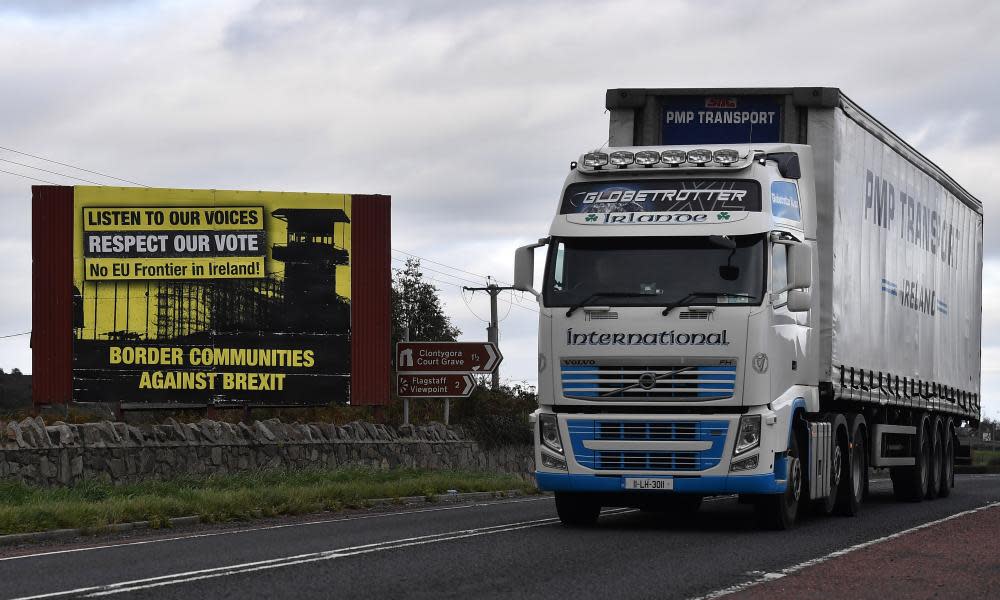No-deal Brexit would mean hard Irish border, EU confirms

The EU has put further pressure on the Brexit talks by confirming it will enforce a hard border on the island of Ireland in the event of a no-deal outcome, despite the risk this would pose to peace.
In comments that proved highly uncomfortable for Dublin, the chief spokesman for Jean-Claude Juncker the European commission president, told reporters in Brussels it was “pretty obvious” border infrastructure would be necessary if the UK were to leave without an agreement.
The Irish and British governments have been wary of speculating about the repercussions of the UK leaving the EU with no deal in place.
Ireland’s deputy prime minister, Simon Coveney, was caught on tape last week indicating his fellow ministers should not talk about the resumption of border checks publicly for fear of a backlash.
In a private conversation, he told the Irish transport minister, Shane Ross, “once you start talking about checks anywhere near the border, people will start delving into that and all of a sudden we’ll be the government that reintroduced a physical border on the island of Ireland”.
But the Juncker’s spokesman said on Tuesday the likely enforcement of border checks could not be avoided.
“If you were to push me to speculate on what might happen in a no-deal scenario in Ireland, I think it is pretty obvious you will have a hard border, and our commitments to the Good Friday agreement and everything we have been doing for years with our tools, instruments and programmes will have to take inevitably into account this fact,” he said.
“So of course we are for peace. Of course we stand behind the Good Friday agreement, but that is what no-deal would entail.”
In the Irish parliament, the prime minister, Leo Varadkar, responded by insisting an arrangement similar to the Irish backstop would still have to be negotiated if the Brexit deal failed to get through the UK parliament.
“We’d have to negotiate an agreement on customs and regulations so that there would be no hard border,” he said. “We already have that agreement. It is the backstop … We have a proposal that does work. We have to stand by it.”
On Tuesday night, the Irish government reiterated that position in a statement that said: “We will not accept a hard border on this island and therefore we are not planning for one. This will be more difficult to achieve without the withdrawal agreement and would require very difficult discussions with our EU partners.
“Working out suitable customs and trade arrangements compatible with our EU membership will require detailed discussion with the commission, while the UK will also need to live up to its responsibilities. We are under no illusions about how challenging that would be.”
The Democratic Unionist party’s Brexit spokesman, Sammy Wilson, dismissed the remarks by Juncker’s spokesman.
More belligerent bluffing from the EU in a desperate attempt to up the ante. It didn’t work before and it won’t work now. https://t.co/HWYmAi3rxy
— Sammy Wilson MP (@eastantrimmp) January 22, 2019
In the event of a no-deal Brexit, the UK would leave the customs union and single market, without any transition period, and a range of checks would immediately be required on goods passing through the border between Northern Ireland and the Republic of Ireland.
The commission spokesman said a no-deal scenario had become more realistic in recent days and echoed the complaints of many in the House of Commons about Theresa May’s statement on Monday, by claiming “at this stage we have nothing new to say from Brussels because there is nothing new from London”.
“We continue to follow very closely the ongoing parliamentary debate in the UK. We urge the UK to clarify its intentions as soon as possible,” the spokesman said.
During her appearance in the Commons, May insisted she had listened to the MPs who voted down her deal, but was subsequently accused of failing to offer any new ideas to win round parliament. May’s deal was rejected last week by 230 votes, the heaviest defeat for a sitting British government.
There is a growing belief in Brussels that the UK will not leave the EU on 29 March.
Giving evidence to the European parliament’s constitutional affairs committee, the chamber’s Brexit coordinator, Guy Verhofstadt, said the EU needed to be “firm and flexible” on extending article 50, as he dropped his previous opposition to prolonging talks beyond the summer.
The Liberal MEP said it would be more difficult to prolong article 50 beyond 2 July, the first day of the new parliament. However, he did not rule out an extension beyond the summer, a prospect he described as “unthinkable” six days ago.
“We have to be firm and flexible at the same time,” Verhofstadt told MEPs. “Firm on what the treaty is saying, but be flexible on the date, if we are clear what is on the table, that there is a majority for something.”
Listing the reasons for extending article 50, he included not only a second referendum, but more time to implement the decision of the House of Commons after a meaningful vote. But he ruled out any changes to the withdrawal agreement, including the backstop. “There are limits on what we can accept; for us the backstop is non-negotiable.,” Verhofstadt said.

 Yahoo News
Yahoo News 
